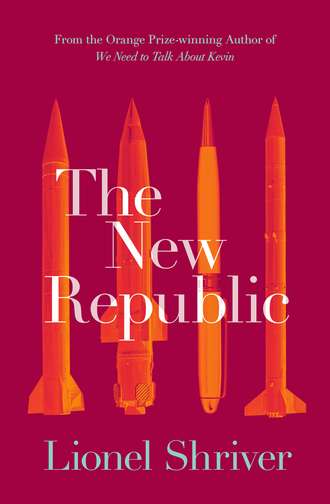
Полная версия
The New Republic
As Edgar slipped his key in the apartment door, he could hear Angela chattering on the phone, and before he’d pushed inside he knew she’d be on her feet.
Pacing, fidgeting from one piece of furniture to another, sure enough Angela was picking and poking at faxes and fountain pens; she couldn’t stand still. Edgar’s entrance earned him a distracted nod. As usual, she’d wedged the receiver between her ear and shoulder so that she could use her hands when she talked. He used to find it charming.
Now Edgar could only picture what Angela doubtless looked like when she was talking on the phone to him. Perhaps she languished on the sofa with her eyes shut, the cord slack, one arm tossed limply midair. In any event, she definitely didn’t use this voice—plosives pipping, aspirates rushing, and fricatives fizzing with the effervescence of Perrier:
“You should have seen him—that’s exactly! Then naturally after—HAH! ha-ha-ha-hahhhhhh …”
As for content, there wouldn’t be any that was discernible on this end. He’d heard her go on like this for an hour without planting enough substantive key words in a row for him to determine whether the conversation was about toenail fungus or Senate hearings on the Waco siege. Of only one thing could Edgar be certain: she was talking to Jamesie—an affectionate private nickname that Edgar had only recently started using aloud.
This glib, gray-templed geeze in his fifties had kept Angela on the side for years. James pre-dated Edgar, who had come to suspect that he wasn’t the first to fill in for James when the old fart was nailing someone else. Angela was forthright about having once been gaga for this big-spending silk importer, but that was all over and now, officially, James and Angela were just “veryveryveryvery good friends.” After two patient years of observation, Edgar had concluded that those two should probably spring for an extra very.
Edgar’s initial tolerance of this “friendship” had won him credit with Angela for being a sophisticated man who realized that all adults in their thirties had pasts. Edgar didn’t go funny when she announced that she was meeting James for dinner, and he didn’t wait up. He didn’t replay Angela’s messages, rifle her mail, or sniff her panties; he didn’t third-degree and he didn’t stage scenes. All of which made him a secure, mature, respectful partner, a.k.a.—Inversion 101—a chump.
“Bye—I can’t now, you know why—later! Bye-bye.” She hung up tenderly. “You wouldn’t believe what—oh, I forgot.” Angela’s bubbly cadence sloshed a bit and then went stagnant. “No more stories about James. You’ve got touchy.”
“Just bored.”
“You were sent some more rejections. They’re on the counter.”
The flaps were sealed. “How can you be sure they’re rejections?”
Angela tossed her hair impatiently, and Edgar finally noticed that it was the same color as the adolescent Toby Falconer’s. “These days, only bad news comes in the mail. That’s what it’s for: to blow you off with as little personal contact as possible. Good news comes in phone calls, or for the last year or two e-mail, if the opposite party is the slightest bit hip. Christ, they should start dyeing all envelopes black.”
“You sure seem torn up about my disappointments.”
“I don’t mean to sound callous, Edgar, but if I stroked your head every time one of those letters arrived, you’d go bald. This journalism gambit sounded good at first, ’cause I thought we’d go somewhere exciting. Even James—” her spine straightened in a refusal to apologize—“James travels everywhere, like, China, Hong Kong. So far your ‘freelancing’ has landed us mostly in this apartment. Night after night, I might add.”
“I’m happy as a clam to eat out,” Edgar said flintily. “You just have to pay for it.”
“I’m a publicist, for Christ’s sake. The Garden swamps me with comps but they pay crumbs, and you can’t satisfy AmEx with free tickets.” She flounced theatrically into the kitchen, to retrieve a lone can of Bartlett pears.
Edgar’s heart wasn’t in an argument, and he cast his eye around his living room with the generosity of nostalgia. Even quotidian quarters achieved an Edward Hopper glow when you were leaving them forever. So did women. Contemplating his girlfriend—her lithe legs, impetuous gold hair, and close breasts that didn’t need a bra but still had an alluring quiver—Edgar despaired that there was one attribute he had never successfully inverted. Good taste boomeranged to snobbery, self-respect to self-regard. But he was at a loss to hold against any woman the fact that she was beautiful.
“Have you ever considered how it might go, living with Jamesie?” Throwing Angela on her new future felt almost as delicious as embracing his own.
“Certainly not, not for years,” she growled, managing to make opening that can look like hard work. “We’re just—”
“Friends,” Edgar completed with a smile; funny, all the old sourness had fled. “You might think twice. Shadowy characters don’t always function in the foreground. If nothing else, Jamesie needs me around to make himself look good.”
“Honestly, Edgar, you’re getting to be impossible!”
Edgar collapsed onto the corduroy sofa with his feet up, feeling dozy, relaxed. You couldn’t say that he didn’t warn her.
Three days later, Edgar withdrew his key from the same lock, and for good measure worked the key off its ring to slip it through the letterbox. He didn’t want to be misunderstood. Shouldering his baggage, Edgar turned his back on the apartment that Angela couldn’t afford, either.
At the elevator, however, he felt a twinge of loss. It wasn’t Angela. It was stuff. All the furniture was his, and he’d not stinted. His suitcase had been too small to accommodate most of his favorite shirts, a closetful of costly suits, or his extensive collection of grunge CDs. He would need, he thought wryly, Replacements.
But then, the alternative course entailed all the recriminatory scenes he’d so elegantly finessed: a tawdry separation of Angela’s Alanis Morissette from his Gin Blossoms, hiring movers and renting storage and breaking the lease—all odious and time-consuming and totally lacking in class. Style required sacrifice. So in lieu of a hasty note, he’d left a cup of coffee cooling and a Camel burning. Leave Angela disconcerted, Edgar figured. He didn’t smoke.
Stashing his boarding card, Edgar flopped into a seat at his Kennedy gate and discarded the unread Wall Street Journal that he’d snagged out of reflex. Though almost as expensive as a round-trip, the one-way ticket tucked in his battered leather bomber jacket had a more intrepid touch and feel.
Repudiation seemed to agree with him. Why, he could acquire a taste for renouncing entire lives like this, and for the present viewed the acquisition of new ones—new friends, new jobs, new lovers—as merely a laborious prerequisite to gleefully forsaking the works. The airport itself, in its all-white nowhere-in-particular-ness, its duty-free replication of dozens of like non-places, offered up a seductive vision of pure departure, a cleanly and permanently wiped slate.
Yet once the flight was called and the plane penetrated the enveloping black vacuum, Edgar’s stomach lurched with the dread certainty that there was only one perfectly negative experience in life, and you got to pull that number only once. Unless he was rescued by an SOB bomb in the cargo hold, the thrill of departure would be inevitably corrupted by arrival somewhere else.
Worse, arrival in a country about which Edgar knew zip, whose politics were notoriously tortuous, where he was supposed to be a reporter. Edgar didn’t know how to be a reporter. Hazily he pictured a journalist dialing up “contacts,” but he’d no idea whom he was meant to phone or what he should ask. In a moment of weakness, Edgar wished faintly that the big, big, big bag of hot air would indeed show up and take his beat back.
The flight attendant was a cow, and her cart was out of light beer. Defiantly, Edgar ordered bourbon, and wolfed down his smoked almonds.
Groping into his carry-on, Edgar lugged out his portable library. The previous afternoon he had ravaged Barnes & Noble’s burgeoning Barba section, scarfing up academic analyses (The Moorish Presence in Barba After the Siege of Lisbon), the odd political treatise (When Democratic Protest Fails: Resort to International Incident as a Consciousness-Raising Tool), recent histories (The Evolution of SOB Strategy and the Rise of O Creme de Barbear), special-interest titles (An Ill Wind: The Role of Weather in Social Defiance), and sensationalist paperbacks (I Was an SOB!—an anonymous memoir by a “reformed Barban bomber” whose authenticity had been hotly contested). His checked bags were lined with general texts on terrorism, most of which said it was bad.
Between sips of JD, Edgar plowed into the book on top, whose first iteration of the right to national self-determination was more soporific than his drink. The author had heavily quoted Tomás Verdade, president of the SOB’s reputed political wing, O Creme de Barbear. Verdade’s verbiage was long-winded and dry, laden with references to dead Barban heroes like Duarte o Estupendo and Teodósio o Terrível, dense with insistence on “defending the integrity of the predominant indigenous culture and the rights of the operative majority within the context of respect for the multiple traditions on a richly varied peninsula”—which, when Edgar applied himself, reduced to xenophobic claptrap.
Three pages and ten national self-determinations later Edgar was ready for another JD. What had he done? The narcolepsy that this Iberian slagheap had always induced in Edgar wasn’t letting up but was growing more intense. In comparison to Tomás Verdade’s prolix patriotismo, briefs on whether water company mergers violated antitrust laws ranked with Sports Illustrated’s swimsuit issue. The only bearable aspect of this story was violent boy-stuff. Over dinner Edgar put aside The Barban Peninsula: A Test Case in Immigration Saturation and devoured Forced Landing!, a breathless account of British Airways’ infamous Flight 321 that bulged with gory photographs.
Meanwhile, the cabin hummed with the susurrant murmur of what Edgar could only assume was Portuguese. Though a soothing drone, it raised a light sweat across the back of his neck. Zhshchaoshzhgoshshdgeshzhye … He’d hoped a year of high school Spanish would help, but this mishmash of consonant blends sounded more like Russian.
“You are a glutton for punishment.”
Edgar glanced over at the bearded, fifty-ish man in the window seat. “You mean, eating airline fettuccini?”
The man chuckled. “The books. Not by any chance headed for beautiful Barba, are you?” he asked sardonically, in-joke.
“I’m covering the province for the National Record.” The claim sounded convincing; at least Edgar’s seatmate didn’t laugh.
Rather, the man’s eyes lit like Christmas. “Why, I’m not graced by the presence of Barrington Saddler, am I? I’d read, to my dismay, that for a time you went missing!” Before Edgar could correct him, the fusty-looking character had wiped his hand on a napkin before extending it across the empty middle seat. “Dr. Ansel P. Henwood, delighted!”
Edgar didn’t know what else to do but to take Henwood’s hand. “Edgar Kellogg.”
Henwood’s fierce clasp went limp.
“Saddler’s still taking his impromptu sabbatical,” Edgar explained.
“My mistake.” Henwood drew back and distractedly wiped his hand on the napkin again. “I’d presumed that such a prominent man of letters must have turned back up, or the mystery of his tragic disappearance would have dominated the news. How quickly we forget! True, I haven’t seen his byline for a while, but then Barba’s been quiet—ominously so, some might say. I’m sure you’ll do a fine job—sir.”
Dr. Henwood seemed already to have forgotten Edgar’s name. Between withering glances thrown Edgar’s way, the man’s expression warped from crestfallen to victorious. He should have known, spoke the scornful gaze. Five-eight and dressed with festive slovenliness, Edgar mustn’t have conformed to Henwood’s preconception of his imposing predecessor.
“Fascinating assignment, of course,” Henwood allowed. “Been there yourself?”
“First time.”
Pushing back his tray, the man reared in his seat, adjusting his tweed lapels. Lacking a pipe and snifter, Henwood settled for brandy in a plastic glass. “This is my third trip. Very difficult place to come to grips with. Hard nut to crack.”
Apparently Edgar’s stony silence was misread as encouragement.
“I’m director of the University of Texas Conflict Studies Department,” Henwood preened. “We’re establishing a PhD program that focuses on Cinzeiro, among other trouble spots. Of course, in Austin we’re confronting a lot of the same complicated issues entailed in massive Mexican immigration, so there’s, shall we say—” a puckish grin—“generous grant money at hand.”
“In the last five years the SOB has killed over two thousand civilians. So they’re assholes. What’s so complicated?”
“Of course, no one endorses their methods—”
“You say that as if being cutthroat is incidental.”
“It can be a distraction. After all, throughout human history numerous causes have merited resort to violence—”
“So if you don’t give me more leg room—” Edgar gestured to a bawling infant in the middle seats—“I shoot the kid.”
“That’s oversimplifying—”
“It’s simplifying,” Edgar differed, noting that Henwood had instinctively pulled his knees back. “Hell of a way to run your affairs, isn’t it?”
“You’ll have to develop a little more sophistication for the likes of the National Record,” the academic declared haughtily. “Your predecessor has an unparalleled sensitivity to the nuances—”
“No one ever warned me when I took this job that I’d have to write horseshit.”
“A lucid argument can be made that the distinction between state and extra-state violence is artificial,” Henwood lectured, unwrapping his dinner mint. “Especially in the creation of new states. Most nations come into being through what could be perceived at the time, from an establishmentarian’s outlook, as ‘atrocities’—including our own US of A. Once a nation is founded, the violence of nation-building is elevated to heroism. The ‘terrorists’ of today are the town-square monuments of tomorrow.”
Edgar had finished off two wine miniatures with dinner, on top of the JDs. His speech was unimpaired, but then he was usually alerted to a growing buzz by the fact that he’d become obnoxious. “So the assholes have always won, the assholes are still winning, and you’d like to see the assholes keep coming out on top.”
“That’s just the sort of reductionist demonization of one party in a divided conflict that only forestalls reconciliation,” the professor chided. “The Barban situation is sufficiently polarized that it’s hardly helpful to heap on more hatred.”
Edgar pressed a button for the flight attendant; this conversation was going to require a lot more booze. “I don’t recall trying to be helpful.”
“To contribute to debate, a journalist is obliged to appreciate the legitimacy of more than one point of view. O C-r-r-reme de Bar-r-rbear-r-r,” Henwood rolled the Rs, “is justifiably alarmed that Barba’s predominantly Catholic culture is being engulfed by container ships full of Muslims emigrating from North Africa. Now, Lisbon’s budget for immigration enforcement is indeed puny, and the government’s approach to this ethnically and religiously charged matter is look-the-other-way. So Verdade makes a credible case that Barba can only get control of its borders through sovereignty.”
“You don’t say,” said Edgar sourly. Even for his own C-minus grasp of the subject, this lowdown was condescending.
“Of course, the logic runs that if the SOB makes life unpleasant enough for Lisbon’s allies and neighbors, powerful friends like the U.S.—with no strategic investment in the integrity of Portugal—will persuade Lisbon to jettison the Barban peninsula. So understandably, Lisbon is torn. Portugal is loath to encourage terrorism. Moreover, the Moroccan and Algerian immigrants, if they’re not fleeing persecution, are simply seeking to better themselves, and there is some reason to worry about mass expulsions and widespread human rights abuses should Barbans be given free rein in their own state—which, unless it applied for admission separately, would also lie outside the mollifying influences of the EU. Yet Portugal is under enormous international pressure to halt the SOB campaign, and the most obvious expedient is to grant Barban independence—”
“How do you ‘contribute to debate’ by getting so lost in mushy sympathy for every side that you sacrifice any perspective whatsoever?” Edgar intruded, reminded once again why as a rule he kept his trap shut on airplanes.
“In turn,” the professor barreled on as if hugging a podium, “opinion polls in Barba do not document majority support for independence—”
“Back up,” Edgar cut him off. “National self-determination for Barba not only has zero support in Portugal as a whole, but minority backing in Barba? So the SOB is bombing the fuck out of the whole world to win independence for a people that don’t want it.”
“Once again, you oversimplify. Amongst native Barban Latinos, there’s a broad-based sympathy with the SOB cause, but discomfort with the armed struggle dilutes—”
“So the fact that the poor fucks don’t even want independence is another distraction, just like the fact that SOB guerrillas are murdering scumbags?”
Other passengers trying to sleep glared over their blankets.
“You have a great deal of reading to do before you’re ready to assume the mantle of someone of Mr. Saddler’s stature. Perhaps I should leave you to it.” Henwood pointed. “May I suggest you begin with that one. I use it in my introductory courses. It’s only a crude overview. But crudeness might appeal to your sensibility at that.” Henwood raised the book in his lap, Comparative Demographic Projections of Citizenship With and Without the Grandfather Clause in Barba, so that the hardback blocked his face.
The prof had gestured to Out of Impasse, authored by, lo and behold, Dr. Ansel P. Henwood. The picture on the back was twenty years old if a day, the weak chin revealing why Henwood had grown a beard. The text did prove useful. Edgar was desperate to grab some shut-eye, and required only three or four lines to fall fast asleep.
chapter 5
Security Theater
Thanks to the edifications of Dr. Henwood, Edgar copped only a few Zs. Bleariness sapped any incipient curiosity about Portugal. Drained and weaving, Edgar was at a loss as to why anyone ever went anywhere besides to bed. He was equally at a loss to explain the purpose of sending passengers through a security check right off the plane, when they’d been through security right before boarding. What were they frisking for, stolen headsets?
At immigration, the dark, petite woman at the desk was brisk but polite, affording Edgar a flickered smile. But once she’d examined his ticket, her cordiality iced over. “You are flying on to Barb-a?” she asked frostily, planting a hook in the word.
Edgar nodded feebly. Immigration always made him feel sneaky.
She stabbed at her computer, attacking keys as if mashing an invasion of ants. “What is the purpose of your visit, please?”
“I’m covering Barba for the National Record.” Hitherto Edgar had enjoyed repeating this assertion in the hopes that it would begin to resonate plausibly to himself, but just now it sounded like a transparent cover for unspeakable wickedness.
“You have documents of this position?”
Edgar rubbed his moist forehead. “I—might, my assignment was last-minute, just—let me check.” Stooping, Edgar scrambled through his carry-on. He should have asked Wallasek for a letter of introduction. Maybe Guy had at least scrawled Saddler’s address on letterhead stationery. Meanwhile, at the next desk, Henwood was flourishing such a snowstorm of papers that the immigration clerk raised a hand to make him stop.
“What is so interesting to Americans about Barb-a?” Edgar’s inquisitor asked stiffly as he splayed books with incriminating titles on the floor. “Much of Portugal is beautiful—Lisboa, O Porto, Algarve. Your newspapers never send reporters to these places. Barb-a is ugly and poor and the people are ungrateful … ressentidos.”
Edgar found the paper; no letterhead. “What can I say? Americans like to read about folks who are—” frantic to ingratiate himself, Edgar grabbed the dictionary from the floor—“mau.”
She didn’t seem impressed with his Portuguese. “You have no documents? Wait one moment, please.” The woman marched off behind a partition, heels hitting the polished floor as if shooting rivets, her ass switching the tight navy skirt. By the time she returned he’d at least scrounged a copy of his prized New Republic article.
“See?” Edgar fingered the byline. “That’s me.”
She squinted. “This is not about Barb-a.”
“I’ve never written about Barba in my life.”
She melted a degree, but rejoined, “Then why you start now?”
“This was the only job I could get!”
Barba-as-desperation-move won him one degree more, but the slight thaw only loosened a floe of tremulous emotion. “I would not put my foot in that latrina for the last job on earth!”
Passengers in line grumbled; only three stations were open.
Recovering herself, the official grilled Edgar about where he planned to reside, entering his new address on Rua da Evaporação into the computer, but making no move to stamp his passport. You have friends in Cinzeiro? You have contacts in the SOB? Edgar fell all over himself denying any such unpalatable acquaintances, adding gratuitously, “Creeps. Dirtbags. No sympathy whatsoever.” The lady eyed him with jaundice; terrorists probably shoveled this shit all the time.
“How long you are planning to stay, Senhor—” she checked his passport—“Kellogg?” Nobody ever seemed to remember Edgar’s name.
“I can’t say. I’m filling in for someone else. He disappeared. He might come back. Barrington Saddler.”
Bingo. Thus far Edgar had been flicking a Bic at this woman’s glacial demeanor, and finally he’d blasted her with a blowtorch. Her eyes went gooey, her head assumed a fetching tilt, and her smile was positively human.
“You know—Barrington?”
“Yes,” said Edgar. “Yes, indeed. Bear and I go way back. Whenever he’s in New York, we do the town. ’Til five a.m., getting kicked out of bars. We’re thick as thieves. Couldn’t be tighter. See?” He shoved the scrap scribbled with Saddler forward. “Bear’s address.”
The functionary touched the paper with a kleptomaniacal expression, as if having to restrain herself from jotting down the phone number. “Disappeared … Is true, I hear something of this months ago.” Her olive brow rumpled; her lips pouted with worry. The woman’s transformation recalled the sitcom spinster who unpins her hair and removes her horn-rims: voilà, a pretty dishy broad. “I am concern. Barrington come through here many times. Sometimes,” she admitted shyly, “he let others go first so he pass through my station. We always have joke. I hope nothing bad happen to him, sim?”
“That’s my first assignment: find out what happened to our friend Barrington. Make sure he’s all right.”
Bam. The stamp.
“Adeus. You find Barrington, tell him Isabel say hallo. Be very careful, senhor.” She even waved.
Because he’d been headed for Barba, Edgar hadn’t been allowed to check his luggage through to his destination, unlike passengers headed anywhere else in continental Europe. Immigration had taken so long that at least his bag was already bumping around the belt, but re-entry into the airport after customs mandated another security check, and yet another at the entrance to Departures. X-rays, hand-frisk, ticket-check, every time.








